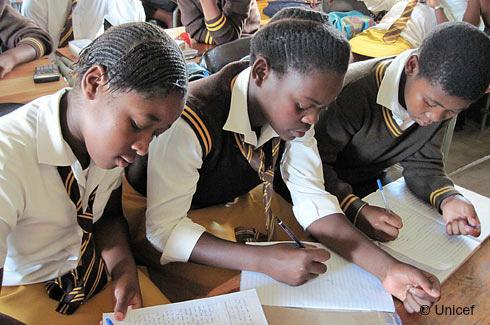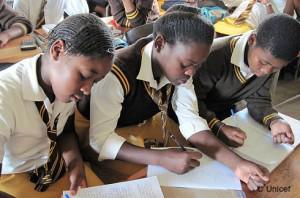Cancer myths about kids kill


Research by the CHOC Childhood Cancer Foundation found that more than 40 percent of South African children with cancer never reach a specialist treatment centre. Standing between children and a chance at life are often low levels of awareness and myths, according to the foundation.
Today marks International Childhood Cancer Day, which aims to raise awareness and battle misconceptions.
“A common myth identified from our work in communities is that children do not get cancer, and if they do, only white children will suffer from the disease,” said Francois Peenz, CHOC Childhood Cancer Foundation chief executive officer.
About 1,000 children in South Africa will be diagnosed with cancer this year while globally 90,000 children, often from developing countries, will lose their lives to the illness.
Developing countries account for about 80 percent of all paediatric cancer cases however survival rates are low due to a lack of access to medicines and care.
“Most parents in these countries bring their children for consultation often at a very late stage and at this point, there are few treatment options available,” said Giorgio Perilongo, president of the International Society of Paediatric Oncology.
Christina Stefan, head of Paediatric Oncology at Cape Town’s Tygerberg Hospital, agreed that delayed diagnoses are a big problem. Children often show up for treatment at an advanced stage of the disease, making the cancer more difficult to treat.
“When diagnosed early childhood cancer is quite curable, however, patients often present with advanced…disease,” Stefan told Health-e.
With better access to care, about 80 percent of all childhood cancer patients diagnosed in richer, developed countries survive.
Childhood cancer is not preventable but here are some cancer warning signs parents should watch out for in order to ensure children are treated sooner rather than later:
- A white spot or spots in the eye, a new squint, blindness or bulging eyeball;
- Lumps in the stomach, head, neck, limbs, testes or glands;
- Unexplained fever, weight loss, loss of appetite, fatigue, easy bruising or bleeding;
- Aching bones, joints, back and easy fractures;
- Change in behaviour, balance and gait, an enlarged head or persistent headaches;
- Generally, parents should seek medical attention for any persistent symptom.
Author
Republish this article
This work is licensed under a Creative Commons Attribution-NoDerivatives 4.0 International License.
Unless otherwise noted, you can republish our articles for free under a Creative Commons license. Here’s what you need to know:
You have to credit Health-e News. In the byline, we prefer “Author Name, Publication.” At the top of the text of your story, include a line that reads: “This story was originally published by Health-e News.” You must link the word “Health-e News” to the original URL of the story.
You must include all of the links from our story, including our newsletter sign up link.
If you use canonical metadata, please use the Health-e News URL. For more information about canonical metadata, click here.
You can’t edit our material, except to reflect relative changes in time, location and editorial style. (For example, “yesterday” can be changed to “last week”)
You have no rights to sell, license, syndicate, or otherwise represent yourself as the authorized owner of our material to any third parties. This means that you cannot actively publish or submit our work for syndication to third party platforms or apps like Apple News or Google News. Health-e News understands that publishers cannot fully control when certain third parties automatically summarise or crawl content from publishers’ own sites.
You can’t republish our material wholesale, or automatically; you need to select stories to be republished individually.
If you share republished stories on social media, we’d appreciate being tagged in your posts. You can find us on Twitter @HealthENews, Instagram @healthenews, and Facebook Health-e News Service.
You can grab HTML code for our stories easily. Click on the Creative Commons logo on our stories. You’ll find it with the other share buttons.
If you have any other questions, contact info@health-e.org.za.
Cancer myths about kids kill
by wilmastassen, Health-e News
February 15, 2014
MOST READ
FS woman waits 4 years for medical negligence pay out after ‘out of court settlement’
Prolonged power outage leaves hospitals in the dark for two days
There’s more to self-care than scented candles or massages, it’s a key public health tool
Access to clean water and stable electricity could go a long way to addressing rising food poisoning in SA
EDITOR'S PICKS
Related


Patents could block access to breast cancer treatment for decades

